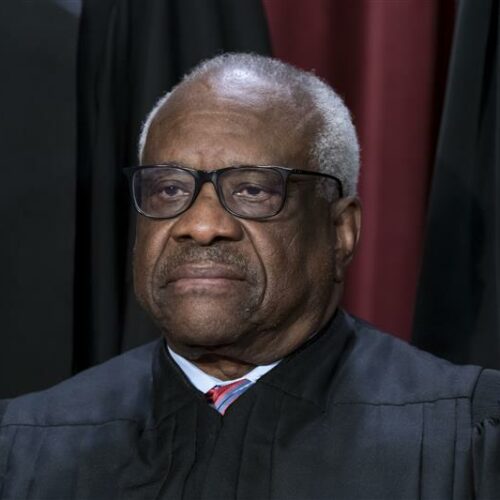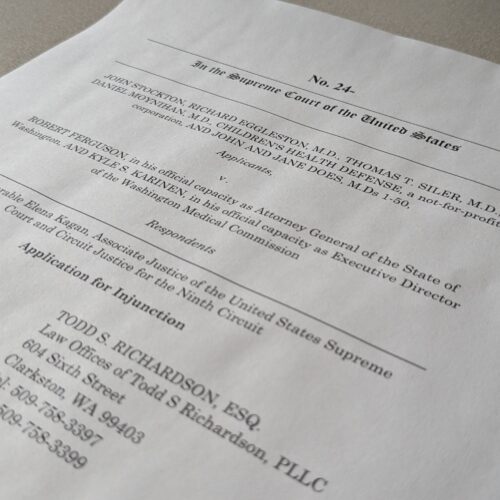
Coronavirus Prompts New Mandatory Work Measures At Washington State Agencies
READ ON
Updated March 17, 2020, 9:45 a.m. PT
Even as Washington Gov. Jay Inslee uses his emergency powers to restrict gatherings of more than 50 people and orders the closure of bars, restaurants and other gathering spaces for at least the next two weeks, state agencies are scrambling to implement emergency measures to protect their employees and those they serve from the rapid spread of coronavirus.
At the Department of Corrections (DOC), where two employees have tested positive for COVID-19 (one at the Monroe Correctional Complex and one at the agency’s headquarters in Tumwater), new screening measures are in place as staff arrive for work — whether at headquarters, one of the state’s 12 prisons, a work release center or field office.
Agency spokesperson Janelle Guthrie said that employees are asked a series of five questions to determine if they have the telltale symptoms of coronavirus. Soon, everyone will also have their temperature taken. However, Guthrie said, there have been challenges obtaining enough thermometers for all of the agency’s worksites. Employees are also being allowed to telework when feasible.
In addition, more than 380 low-and-medium custody inmates in two housing units at the Monroe prison are in a semi-quarantine, with their movements restricted, after the staff member there tested positive last week.
Some fellow staff who had close contact with the infected individual are also in self-quarantine at home for the next two weeks.
Previously, DOC restricted visitation, including family visits, at its prisons and suspended all tours and events. The agency said it’s working to temporarily reduce or suspend the cost for families to communicate with inmates via phone calls and video chats.
As concerns rise among families of people who are incarcerated, the state’s Office of the Corrections Ombudsman announced Monday it will begin holding daily conference calls with family members to share information and hear concerns.
FAQ
In a Frequently Asked Questions page on its website, DOC says all of its prisons now have access to coronavirus testing through three different labs, but that more viral swabs are on order. The decision to test an inmate is based on the determination of a health care provider.
The prison system said it’s also encouraging social distancing when feasible and increasing cleaning and sanitation. But in an email obtained by the Northwest News Network, an inmate who is housed in one of the quarantined units wrote: “They are not asking us to practice social-distancing, just merrily spraying away at surfaces.”
In the event an inmate tests positive for COVID-19, DOC said it would isolate the individual and quarantine others who are in close proximity. That hasn’t happened yet. If a Washington prison were to experience an outbreak of COVID-19, with multiple cases, the agency said it has a continuity of operations plan and has preemptively activated its incident response system.
But some family members are criticizing DOC’s response as inadequate and are calling for a number of additional measures, including allowing inmates to use alcohol-based hand sanitizer which they say is currently classified as contraband. In response, DOC said that washing hands is the most effective protection and that its encouraging inmates to do so frequently “in their cells or in restrooms available to them.” The families are also urging “compassionate release” for the 51 inmates in the system who are over 80 years old saying they are at “grave risk.”
“Not Alarmist”
Separately, on Monday, a number of advocacy groups, including Disability Rights Washington and the ACLU of Washington, wrote letters to Inslee and Secretary of Corrections Steve Sinclair warning that if COVID-19 takes hold in a correctional setting, “it is not alarmist to believe that DOC could be facing many thousands of people infected with the virus.”
Among the immediate steps the groups are calling for is the early release of all inmates who are within six months of their release date, as well as all inmates 56 and older.
“While people in this age group are at the greatest risk of death from COVID-19, they also pose the lowest public safety risk to our communities,” the letters said. “This vulnerable population should be released immediately.”
The advocacy groups are also urging Inslee to release medically-compromised juveniles who are nearing the end of their sentences and asking Inslee to direct counties to “significantly reduce their jail populations.” In a response Monday afternoon, DOC said that while it understands the concerns for chronically ill or elderly inmates, the agency is “not able to release them into the community” because sentences are “statutorily mandated.”
Prisons aren’t the only state facilities serving potentially vulnerable individuals in confined spaces where the coronavirus could take hold.
On March 6, Washington’s Department of Social and Health Services (DSHS) announced it would begin screening visitors at all of its facilities, including Western and Eastern State Hospitals, the Special Commitment Center for sex offenders on McNeil Island and its four Residential Habilitation Centers for people with developmental disabilities.
“We are doing everything we can to keep this virus from entering into our facilities,” Dr. Brian Waiblinger, the agency’s chief medical officer, said in a statement. So far the agency has not reported a confirmed case of COVID-19.
Suspending Visitations
On Tuesday morning, based on Inslee’s expanded order, DSHS announced it was suspending most visitation at its facilities with the exception of legal professionals and advocates from groups like Disability Rights Washington. Exceptions would also be made in end-of-life situations. Also, children at the Child Study and Treatment Center in Lakewood will still be allowed one adult visitor a day.
As of Monday, Washington remained the epicenter of the nation’s coronavirus epidemic with more than a quarter of the cases nationally (904) and 71 percent (48) of the deaths. In temporarily shutting down hundreds, if not thousands, of businesses across the state — from restaurants to food courts to tattoo parlors to nail salons — and further restricting crowd sizes, Inslee urged people to stay home for the next two weeks unless it’s absolutely necessary to go out.
“If we are living a normal life right now, we’re just not doing our jobs as Washingtonians,” Inslee said.
The ripple effect, not just across the private sector, but the public sector too is stark — and in many cases unprecedented.
Following the governor’s announcement, Attorney General Bob Ferguson — who oversees what’s often described as the state’s largest law firm — announced that he’s ordering all of his roughly 1200 employees to work from home. “My office is doing our part during this crisis,” Ferguson said in a statement.
Washington State Auditor Pat McCarthy has also ordered her employees to telework until further notice.
Effective Monday, the Secretary of State’s office announced it was suspending most in-person services until further notice, including closing the Washington State Archives and the Corporations and Charities division to the general public. Online services will remain available.
“The health and safety of my staff and those who visit our office is paramount,” Secretary of State Kim Wyman said in a statement. “I want to assure the public the Office of the Secretary of State will remain fully in operation during this time; the majority of our services can be performed and accomplished online or via other virtual processes.”
At the Washington Supreme Court, oral arguments scheduled for this week have been canceled. Court spokesperson Wendy Ferrell said they will be moved to the spring term, unless the parties to the cases decide they want the justices to proceed with deciding the cases without oral arguments.
If restrictions on crowd size and recommendations for social distancing continue into the spring term, which begins May 5, Ferrell said the court may make modifications to ensure those public health practices are adhered to while also maintaining open proceedings.
On Monday evening, Chief Justice Debra Stephens issued an order closing the Temple of Justice to the public until May 5. Located on the Capitol campus in Olympia, the building houses the Supreme Court and the Washington State Law Library. All court business will be done electronically or by mail in the meantime.
While the Washington Legislature has adjourned its 60 day session, legislative staffers are typically full-time and year-round employees. On Friday, House Clerk Bernard Dean extended to all House employees the opportunity to work remotely. In his email to staff, Dean also said the House and Senate were “exploring the possibility of a deep cleaning of all office spaces.”
Related Stories:

COVID-19, 5 years later: Reflections on the scars we carry, and resilience in unprecedented times
NWPB caught up with local residents and doctors to talk about how they’ve moved forward following the COVID-19 pandemic. They spoke about how the experience changed them and wisdom they’ve gleaned along the way. These are their reflections.

US Supreme Court will consider petition for stay in COVID-19 free speech case
The U.S. Supreme Court will review an application for a stay in a federal lawsuit involving local retired eye doctor Richard Eggleston.

Group representing retired Clarkston ophthalmologist asks US Supreme Court for injunctive relief
A retired Clarkston eye doctor is part of a group asking the U-S Supreme Court to grant an injunction in a lawsuit against Washington state officials.















